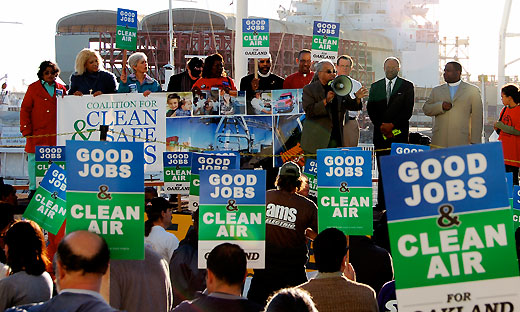
Members of Congress are stepping up the fight to overturn a longstanding roadblock to cleaning up air pollution affecting some 87 million people living near major U.S. ports, and to establishing fair working conditions for many of the 110,000 truck drivers serving the ports.
S. 2011, the Clean Ports Act, introduced Dec. 16 by Senator Kirsten Gillibrand, D-N.Y. with five other original co-sponsors, would give local governments new ways to make companies operating big-rig trucks at the ports comply with emissions limits. The measure is a companion bill to H.R. 572, earlier introduced into the House of Representatives by Rep. Jerrold Nadler, D-N.Y.
Gillibrand, a member of the Senate’s Environment and Public Works Committee, said Congress “must act to provide New York, and cities all across the country, with the common sense tools they need to improve the quality of air and quality of life for millions of people.”
The Clean Ports Act would clarify an obscure provision in the 30-year-old Motor Carrier Act barring local agencies from using their regulatory powers to enforce clean air standards.
This would open the way for regulations such as the Port of Los Angeles’ attempt to require that trucking firms hire their drivers – now classified as “independent contractors” – as employees, and take responsibility to make sure the trucks meet environmental standards.
Though other provisions survived, that requirement was overturned when the American Trucking Associations sued to gut the port’s Clean Trucks Program.
In a statement, David Foster, executive director of the nationwide BlueGreen Alliance of unions and environmental organizations, said the measure would “free ports across the country to do right by their communities, workers, and the environment, all the while supporting a healthy bottom line.”
Foster said he hopes S. 2011 “will help ensure the cost of improving air quality is shouldered by the industries affecting it, and not by the hard-working drivers.”
Introduction of the Clean Ports Act in the Senate is the latest action in a long-running fight by environmental groups, unions and port drivers to clean up the diesel emissions that are causing high rates of asthma and heart disease in areas near the nation’s ports, and to win fair working conditions for drivers, including the right to organize.
A key part of that struggle is ending the drivers’ misclassification. After deregulation of the trucking industry in 1980, most drivers are now responsible for the condition of their trucks, while being denied health coverage, workers’ compensation and unemployment benefits. Others now must pay trucking firms to lease their trucks.
In an Open Letter from America’s Port Truck Drivers issued Dec. 12, the day the Occupy movement protested at West Coast ports, a group of port drivers told of working long hours under unhealthy and unsafe conditions while being denied even the right to negotiate their rates of payment.
According to a recent report, The Big-Rig, Poverty, Pollution and the Misclassification of Truck Drivers at America’s Ports contract drivers now are paid an average of less than $12 an hour, compared to nearly $15 for employees.
Under the Obama administration, the Labor Department is also working hard to end misclassification of the drivers and many other workers as independent contractors. The department, which has hired 300 new investigators, has recovered over $5 million in back wages for nearly 8,000 misclassified workers – five times as much as was collected in the last year of the Bush administration.
Besides the BlueGreen Alliance, supporters of Sen. Gillibrand’s bill include the mayors and city councils of New York and Newark, N.J., the mayors of Los Angeles, Oakland and Seattle, the Coalition for Clean and Safe Ports, the Los Angeles Alliance for a New Economy, the Alliance for a Greater New York, the Sierra Club and the International
Photo: Coalition for Clean and Safe Ports












Comments